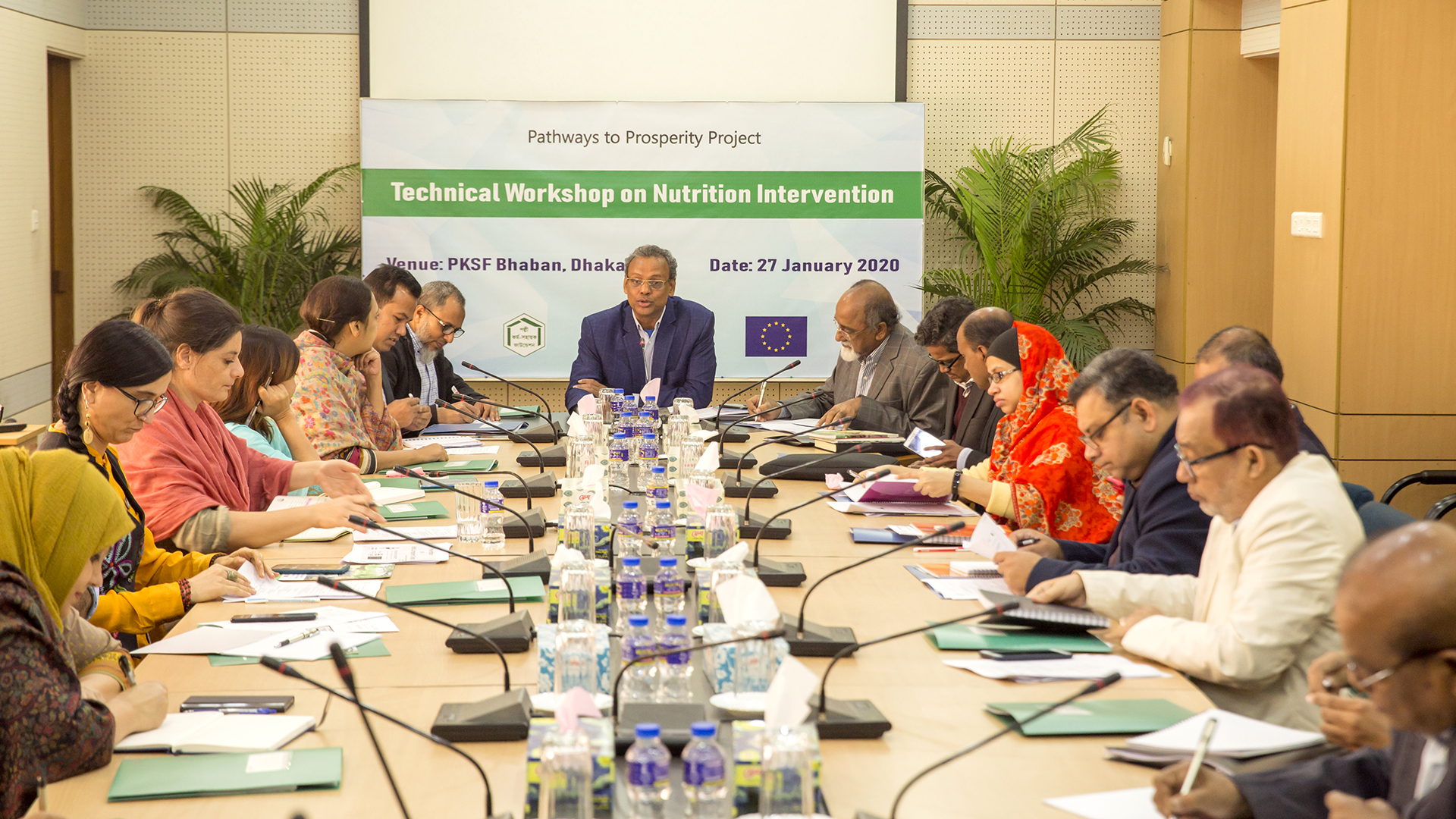PKSF DMD Golam Mawla tells technical workshop on Nutrition Framework
The Pathways to Prosperity project will provide nutrition interventions on a lifecycle basis to bring the extreme-poor households out of the malnutrition trap, which will enhance their human capital, ultimately leading to higher productivity, PKSF Deputy Managing Director AQM Golam Mawla has said.
This is why all interventions under the project are being designed based on the Asset Pentagon, he said, adding, “While the project’s Livelihoods component will increase the income of the extreme poor households, the Nutrition component will help stop their income erosion.”
Golam Mawla, also the project director, was speaking at a workshop titled “Technical Workshop on Conceptual Framework of Nutrition Intervention” at the PKSF Bhaban on 27 January 2020.
The Project Implementation Unit of the Pathways to Prosperity project organised the half-day event, attended by representatives from the DFID and the EU, who are jointly funding the project, academics as well as officials from a number of international NGOs.
Executive directors of a number of Partner Organisations of the PKSF as well as the entire Team Prosperity, including PKSF general managers Dr Sharif Ahmed Chowdhury and Dr AKM Nuruzzaman, were also present.
Presenting the Framework, PKSF managers Tanzina Nur Jinia and Md Rayhan Mostak explained how the Nutrition team plans to ensure various nutrition and health services offered by various public and private institutions. Three target groups – individuals, households and the larger community – will get support under the interventions.
The Framework addresses the nutritional need of the extreme poor households on a lifecycle basis, starting from the date of pregnancy covering the “1,000 Golden Days” of a child’s life and then throughout the lactation period.
The target participants – pregnant and lactating women, under-5 children, adolescent boys and girls, elderly people and persons with disability – will be brought under both Nutrition Specific and Nutrition-Sensitive interventions.
The Framework has been prepared in a way so that it also addresses the three cross-cutting issues while also creating linkage with other core components, especially Livelihoods and Community Mobilisation, for maximum impacts.
Tanzina and Rayhan were assisted by Rasadul Hassan, Programme Manager, Disability Inclusion, and Sanjida Ahmed, Programme Manager, Gender.
Before the presentation on the Framework, Dr Sharif Ahmed, also the project adviser, gave a presentation on the project objectives, components, working area and the target group. He also shared some of the initial findings in the piloting phase, which began on 1 October 2019.
Briefing about the project, Dr Sharif said that the extreme poor people in the target households will receive a range of services from a flexible menu so that they can exit extreme poverty and eventually set up their own enterprises for their sustainable development.
After the presentation, representatives from the DFID, the EU and other organisations offered a number of inputs and suggestions to improve the design. They also stressed the need for prioritising the activities under the Nutrition component.
Tasneem Rahman, Programme Management Adviser at the DFID, said that the crucial thing here is the sustainability of the project outcomes even after its exit.
Taskeen Chowdhury, Nutrition Specialist at the USAID, spoke about the need for engaging the relevant ministries and government agencies for wider impacts.
DFID’s Health Adviser Dr Md Shafiqul Islam recommended linking the activities under the Nutrition interventions with the government and also to consider bringing the informal sector, such as quacks and village doctors, on board.
Terming Pathways to Prosperity a unique programme in terms of its design, Feroz Ahmed, Livelihood Adviser at the DFID, highlighted the importance of addressing malnutrition for higher productivity and economic growth, both at the household level and national level.
PKSF General Manager Dr AKM Nuruzzaman moderated the discussion and question-answer session.
In his concluding remarks, Golam Mawla said that the PKSF is designing the interventions under all the components in an integrated way, and not in a separate way.
He also thanked the participants for their feedback to improve the Nutrition Framework.
Meriem El Harouchi, Attaché, Programme Manager-Social Protection at the EU; Shashwatee Biplob Talucder, Programme Manager-Social Protection at the EU; Saiqa Siraji, Country Director of Nutrition International; Dr Mohammad Raisul Haque, Senior Technical Advisor, Nutrition, at Save the Children; Prof Dr Khaleda Islam of the Institute of Nutrition and Food Science at Dhaka University; and Badrun Nessa Ahmed, research associate at Bangladesh Institute of Development Studies, also took part in the workshop.


